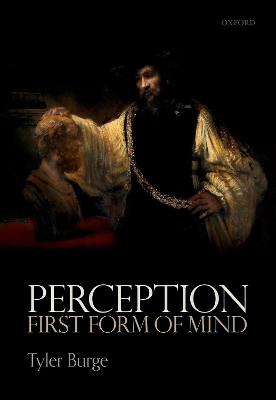
Perception: First Form of Mind
Oxford University Press (Verlag)
978-0-19-887100-2 (ISBN)
In Perception: First Form of Mind, Tyler Burge develops an understanding of the most primitive type of mental representational: perception. Focusing on the functions and capacities of perceptual states, Burge accounts for their representational content and structure, and develops a formal semantics for them. The discussion explains the role of iconic format in the structure. It also situates the accounts of content, structure, and semantics within scientific explanations of perceptual-state formation, emphasizing formation of perceptual categorization. In the book's second half, Burge discusses what a perceptual system is. Exploration of relations between perception and other primitive capacities-conation, attention, memory, anticipation, affect, learning, and imagining-helps distinguish perceiving, with its associated capacities, from thinking, with its associated capacities. Drawing mainly on vision science, not introspection, Perception: First Form of Mind is a rigorous, agenda-setting work in philosophy of perception and philosophy of science.
Tyler Burge is Flint Professor of Philosophy, UCLA, where has taught since 1971. He has held visiting positions at Harvard, MIT, Stanford, Munich, Bayreuth, Bologna, and Zurich. He has delivered numerous named lecture series, including the Locke Lectures, Dewey Lectures, Whitehead Lectures, Kant Lectures, Petrus Hispanus Lectures, and Nicod Lectures. His work has made contributions to philosophy of mind, philosophy of psychologyepistemology, philosophy of language, philosophy of logic, and the history of philosophy. He has published four books with OUP: Origins of Objectivity (2010) and three volumes of essays, Truth, Thought, Reason (2005), Foundations of Mind (2007), and Cognition through Understanding (2013).
Preface
Part I: Perception
1: Introduction
2: Perception
3: Perceptual Constancy: A Central Psychological Natural Kind
Part II: Form
4: Some Basics about Perception and Perceptual Systems
5: Perceptual Reference Requires Perceptual Attribution
6: Form and Semantics of Perceptual Representational Contents
7: Perceptual Attributives and Referential Applications in Perceptual Constancies
8: Egocentric Indexing in Perceptual Spatial and Temporal Frameworks
9: The Iconic Nature of Perception
Part III: Formation
10: First-formed Perception
11: Intra-saccadic Perception and Recurrent Processing
12: Further Attributives: Primitive Attribution of Causation, Agency
Part IV: System
13: Perceptual-level Representation and Categorization
14: Perceptual-level Conation and Relatively Primitive, Perceptually Guided Action
15: Perceptual Attention
16: Perceptual Memory I: Shorter Term Systems
17: Perceptual Memory II: Visual Perceptual Long-Term Memory
18: Perceptual Learning, Perceptual Anticipation, Perceptual Imagining
19: Perception and Cognition
20: Conclusion
| Erscheinungsdatum | 06.09.2021 |
|---|---|
| Verlagsort | Oxford |
| Sprache | englisch |
| Maße | 175 x 252 mm |
| Gewicht | 1818 g |
| Themenwelt | Geisteswissenschaften ► Philosophie ► Erkenntnistheorie / Wissenschaftstheorie |
| Geisteswissenschaften ► Psychologie ► Allgemeine Psychologie | |
| ISBN-10 | 0-19-887100-7 / 0198871007 |
| ISBN-13 | 978-0-19-887100-2 / 9780198871002 |
| Zustand | Neuware |
| Haben Sie eine Frage zum Produkt? |
aus dem Bereich


![Was heißt Denken?. Vorlesung Wintersemester 1951/52. [Was bedeutet das alles?] - Martin Heidegger](/media/113619842)